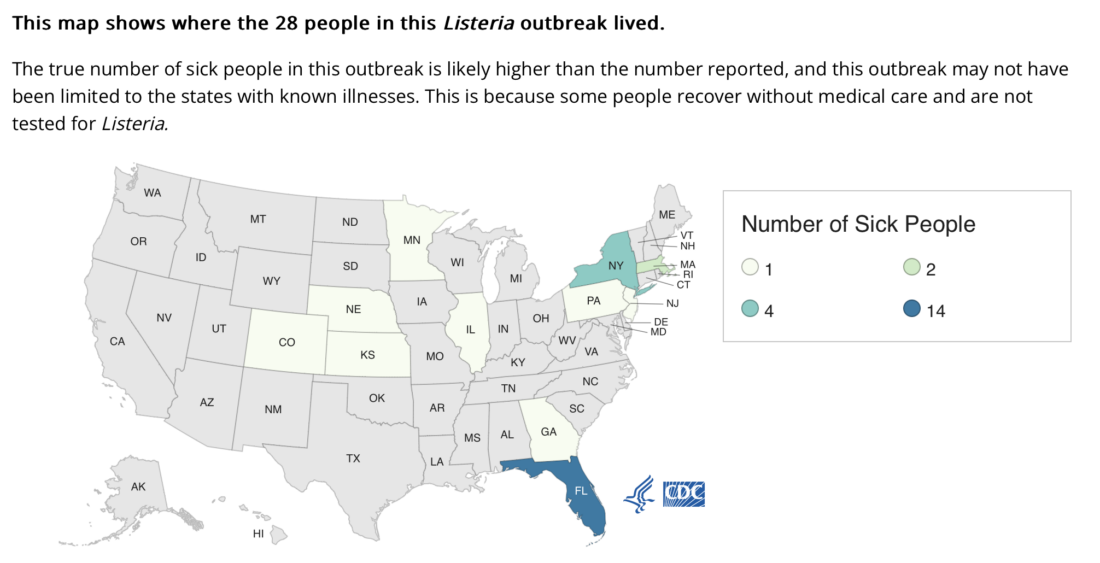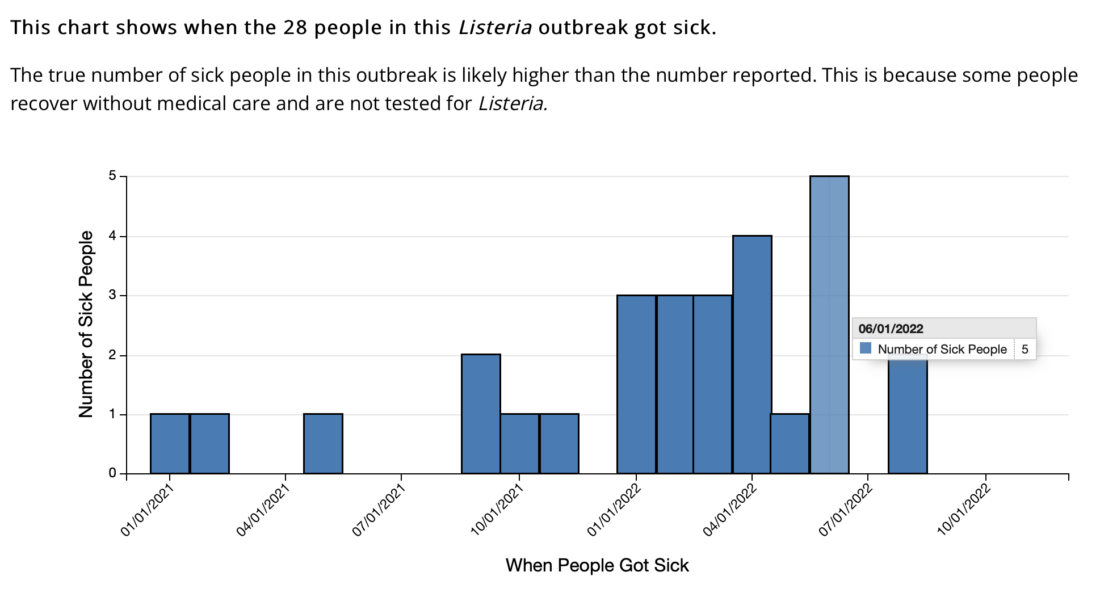Marler Clark, the foodborne illness attorneys, represent a victim in this outbreak that died after consuming the Listeria tainted product.
CDC, public health and regulatory officials in several states, and the U.S. Food and Drug Administration (FDA), investigated a multistate outbreak of Listeria monocytogenes infections.
Epidemiologic, laboratory, and traceback data showed that Big Olaf Creamery ice cream made people sick.
As of November 2, 2022, this outbreak is over.
A total of 28 people infected with the outbreak strain of Listeria monocytogenes were reported from 11 states. Florida residents accounted for 14 victims, while 11 reported traveling to Florida before becoming ill. Of the 28 people sick, 27 were hospitalized. One death was reported from Illinois.

Samples of those sickened were collected between January 24, 2021, to August 19, 2022.
Sick people range in age from less than 1 to 92 years, with a median age of 62, 50% were female. Seven illnesses were among pregnant women or newborns. people became ill during their pregnancy. One illness resulted in a fetal loss.

The true number of sick people in an outbreak is likely higher than the number reported, and the outbreak may not be limited to the states with known illnesses. Often people recover without medical care and are not tested for Listeria.
Of the 23 people interviewed and asked about the foods they ate prior to becoming ill, all reported eating ice cream, and 16 reported eating Big Olaf Creamery brand ice cream or eating ice cream at locations that have been supplied by Big Olaf Creamery. Four illness clusters were identified in this outbreak. An illness cluster is defined as two or more people who do not live in the same household who report eating food from the same retail location before getting sick. If several unrelated sick people ate food from the same retail location, it suggests that the contaminated food item was served or sold there. Ten people were identified as being part of four illness clusters and all clusters were linked to retail locations that sold Big Olaf Creamery ice cream.
Investigators used the PulseNet system to identify illnesses that might be part of this outbreak. CDC PulseNet manages a national database of DNA fingerprints of bacteria that cause foodborne illnesses. DNA fingerprinting is performed on bacteria using a method called whole genome sequencing (WGS).
WGS showed that bacteria from sick people’s samples are closely related genetically. This means that people in this outbreak got sick from the same food, Big Olaf Ice Cream.
The Florida Department of Agriculture and Consumer Services (FDACS) collected samples of ice cream and environmental samples from the ice cream production area at the Big Olaf Creamery facility in Sarasota, Florida. FDACS also performed WGS on these samples, and the Florida Department of Health identified the outbreak strain in the samples collected from the ice cream and the environment.
On July 2, 2022, CDC advised people who had Big Olaf Creamery ice cream at home to throw away any remaining product. On July 13, 2022, Big Olaf Creamery LLC recalled all flavors, lots, and expiration dates of Big Olaf brand ice cream through June 30, 2022.
Listeriosis is a serious infection caused by eating food contaminated with the bacterium Listeria monocytogenes. Listeria has been found in a variety of raw foods, such as uncooked meats and unpasteurized (raw) milk products. Listeria is killed by heating, but contrary to many other bacteria it thrives in the cool temperatures such as those provided by refrigeration. Therefore Listeria may be found on ready-to-eat foods such as cheese, hot dogs, deli meats, or produce.
Symptoms of Listeria Infection
Listeria has an incubation period of 21-70 days, so a person with an infection may not realize it for sometime after eating a contaminated food. When symptoms develop they typically manifest themselves in the form of fever, muscle aches, and sometimes diarrhea or nausea.
A Listeria infection may spread to the nervous system which may cause headache, stiff neck, loss of balance, or convulsions. In some cases Listeria may infect the central nervous system causing meningitis and/or brain infection.
If a pregnant woman becomes infected, miscarriage, sillbirth, or infection of the newborn can occur.
What to do if you think you have Listeria
If you think you or someone you know has contracted a Listeria infection consult a doctor immediately.
If you or a family member became ill with a Listeria infection after consuming contaminated food and you’re interested in pursuing a legal claim, you can contact the Marler Clark attorneys for a free case evaluation.
The Marler Clark Listeria lawyers have unmatched Listeria litigation experience and are readily available to talk with you about your legal options regarding any damages or losses incurred as a result of your Listeria infection.
Marler Clark has represented countless Listeria victims and is the only firm in the nation with a practice focused exclusively on plaintiff foodborne illness litigation.
Fill out the contact form or call toll-free at 800-884-9840. There is no cost to you.